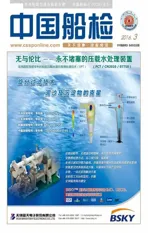Fumigation Risk During Sea Transportation Should Be Paid Attention
2016-01-03
Recently, the North British Protection and Indemnity Club issued a caution, calling for“attention being paid to risk of agricultural product fumigation during sea transportation”. The caution further noted:“It is often happened that onboard the bulk carriers carrying agricultural goods, dispersion of fumigation sanitizer particles are not rightly carried out.These particles often result in automatic heating, which is the main cause for ship explosion and fire.
In order to make the industry better understand the additional caution, experts gave special explanations of the cause of“aluminium phosphide self-heating”, hoping that carriers should pay their attention.
The reporter believes that the following require deep consideration of the industry.
One insider indicated that unqualified aluminium phosphide products increase the probability of explosion and fire accidents caused by fumigation during operation.So, what are the features of qualified aluminium phosphide products? Experts explain that qualified products can release carbon dioxide and ammonia gas which can retard burning after reaction to reduce the risk of burning. Unqualified products will bring potential risks to sea transportation.
In addition, unsound management systems of some shipping companies will also bring potential risks to fumigation during operation. It is said that there is no tapioca chip fumigation program in the management system of some companies, and land-based support departments have not even made corresponding working procedure and notice to regulate the work.
Accident statistics indicate that fumigation accidents are usually caused by crew’s lack of understanding of aluminium phosphide fumigation agent. Incorrect treatment of fumigation residue may cause accidents during transportation and unloading. Other causes include violation of the procedure for fumigation and ventilation,some cargo tanks are not air-tight before fumigation, or ventilation is not carried out for fumigation according to the defined time schedule during operation.
Experts pointed out that there is still no international convention or international framework in the form of international regulations to clearly regulate the safe use of fumigation agents for ships. Experts suggest that shipping companies should pay more attention to fumigation risk identification, face the potential safety risks, find the optimum solutions. Tapioca chip transportation instructions and working process for fumigation during operation should be developed to improve management system through quantitative evaluation and continuous improvement. In addition, it is suggested that IMO should develop“good that can be fumigated without safety risks” as a supplement to make crew better understand operation process.
